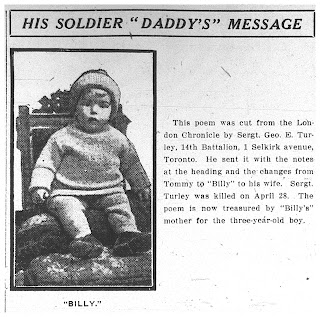I frequently receive messages from people interested in my WW1 research and this one is particularly interesting : Received on 16 June 2022
“Do you know the story of George Evelyn Harold Turley, a Canadian soldier who read the poem ‘ Handing Down’ by Harold Begbie and amended it so it would be relevant to his infant son. Billy. He was killed in April 1916 and the amended poem was published in newspapers all over Canada. A journalist sent a copy to Harold who sent a letter in response to the soldier’s widow and family. Regards Dave Barlee”
I began researching WW1 poets for a series of commemorative exhibitions in May 2012. Ann Swabey very kindly found me a copy of the very first WW1 poem I read - when I was 7 years old. It was copied by my Aunt into her notebook. The poem made a deep impression on me and I never forgot it. My Aunt was in the Wrens during the Second World War. She died in 1948 so the poem is very important to me. I remembered the first line and Ann found the poem for me - "Handing Down" by Harold Begbie. However, I did not know the story that Dave told me about the poem.
Dave Barlee kindly sent me the internet links to the Canadian Veterans website, where one can find the reports of the death of George Evelyn Harold Turley (1887 - 1916), who was born in Kidderminster, Worcestershire, UK.
Canadian Virtual War Memorial George Evelyn Turley In memory of: Sergeant George Evelyn Turley April 28, 1916 Military Service Service Number: 26018 Age: 28 Force: Army Unit: Canadian Infantry (Quebec Regiment) Division: 14th Bn. Additional Information Son of George and Agnes Turley, of Kidderminster, England. Husband of Alice M. Turley, of 9, Gorse Drive, Gorse Hill, Stretford, Manchester, England. Brother of Ernest George Turley, who died on August 15, 1917 while serving with the Canadian Infantry (Central Ontario Regiment).
Commemorated on Page 175 of the First World War Book of Remembrance.
"Handing Down"
Soldier what are you writing
By the side of your cooling gun?
Sir, since Im stopped from fightings
A word to my little son.
Tell me the thing you've written
For I love the writer's art:
Sir, that to be a Briton
Is worth a broken heart.
Show me so fine a letter
That you write in the trenches mud:
Sir, you could read it better
Were it not for the stain of blood.
Soldier tell me your story
Your eyes grow bright and wide:
Sir, it's a taste of glory
To think of the young one's pride.
Would I give a month of Sundays just to see how he has grown?
Yes ! Id like to be a dustman in the poorest London streets
For the chance of meeting Tommy with a gumboil made of sweets.
If you want to be where I am, why, I want to be with you.
But I'm here to show a tyrant that a Briton's word is true
We must stand by little Belgium, we must fight till fighting ends.
We must show the foes of Britain that we don't desert our friends.
Don't you go and think, my Tommy, little Tommy-all-my-own.
That we're squabbling here for nothing, that we're growling for a bone:
We are here for Britain's honour, for our freedom, for our peace.
And we're also here, my Tommy, that these wicked wars may cease.
Don't you say that I am funky, don't you say that I am sick,
Boy, I'm half afraid to tell you, but I love it when it's thick —
When the shells are screaming, bursting, and the whistling bullets wail,
God forgive me, but I love it, and I fight with tooth and nail.
But it's after, looking round us, missing friends and finding dead.
It is then the British soldier gets a fancy in his head.
And he swears by God in heaven that the man who starts a war.
Should go swimming into judgment down an avalanche of gore.
That's what makes us such great fighters, and I'd have you be the same,
Love your country like a good un, hold your head up, play the game,
Be a straight and pleasant neighbour, be a cool, un-ruffled man.
But when bullies want a thrashing, why, you thrash them all you can.
While you say your prayers, my Tommy, little Tommy-all-my-own,
Asking God to save your Daddy, I send this one to His throne:
Save my little lad from slaughter, guard his heart and mind from wrong,
Keep him sweet and kind and gentle, yes, but make him awful strong.
Good-night, my little Tommy, here's your Daddy's good-bye kiss.
Don't forget what I have told you, and remember also this —
If I don't come back to see you, I shall die without a groan,
For it's great to fall for Freedom, little Tommy-all- my-own.
Sources: Find my Past, Free BMD and
https://theodoreturleyfamily.org/biography/4-church-life-in-canada/
https://theodoreturleyfamily.org/biography/2-the-pre-conversion-canadian-years/
https://books.google.co.uk/books?id=9ucqBwAAQBAJ&pg=PA131&lpg=PA131&dq=turley+family+canada&source=bl&ots=Tf3FdpQ9qh&sig=ACfU3U3BW8i6Ip4YXwl7l6rRf_arGJeUPQ&hl=fr&sa=X&ved=2ahUKEwiatIinp7f4AhWMEMAKHW15BLY4ChDoAXoECBQQAw#v=onepage&q=turley%20family%20canada&f=false
https://www.veterans.gc.ca/eng/remembrance/memorials/canadian-virtual-war-memorial/detail/446162















